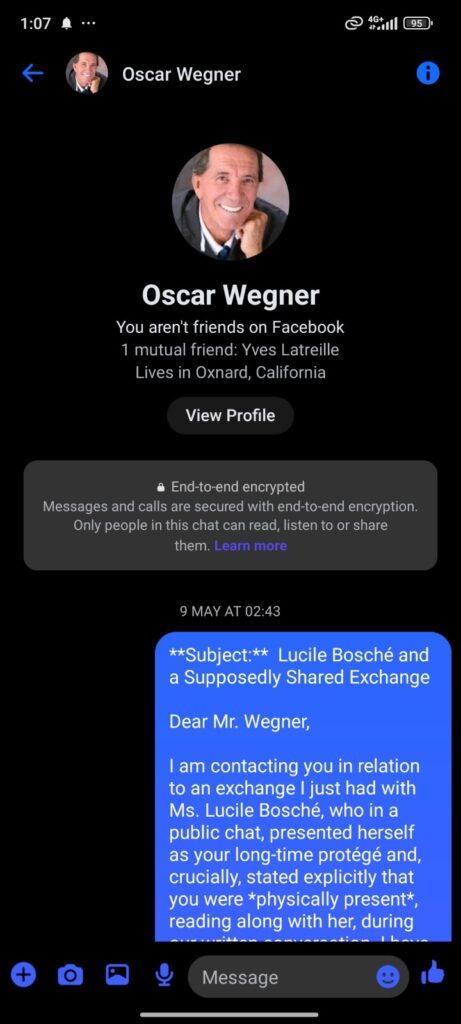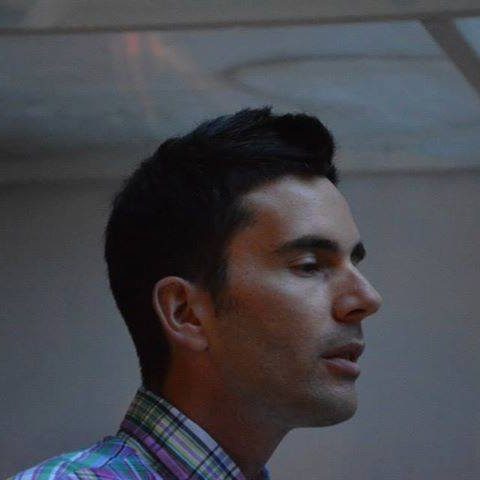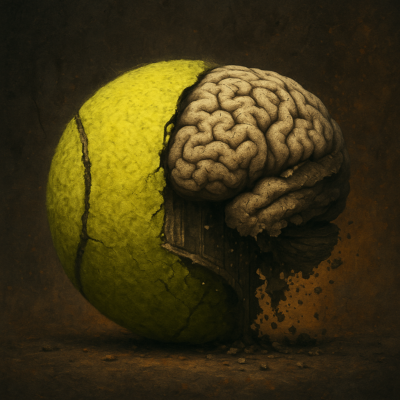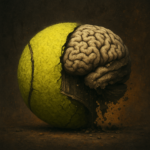A case study in anti-theoretical dogma, from method to censorship.
For the millionth time, I attempted to have a rational, structured dialogue with a prominent figure in the tennis industry: Lucile Bosché—Oscar Wegner’s apprentice and protégé, General Manager of the Modern Tennis Methodology Coaches Association (MTMCA) and of MTM-U, certified MTM Level IV Clinician/Tester, GPTCA Level B Coach, PTR and USPTA Professional Instructor, member of the WTCA and USTA, co-director of Rising Stars Tennis Academy in Southern California, and two-time USTA League Nationals team captain. The result was total failure—not due to her extensive CV—but due to the same pattern I have encountered across continents: refusal to engage, dismissal of counterarguments, rhetorical control over the space of discourse, and the absence of all epistemic virtues (humility, curiosity, openness, and argumental accountability). The problem is not personal. It is systemic. The tennis industry is epistemically broken, populated by unexamined minds shielded by credentials and habit. Bosché is not unique. She is just the latest to reproduce the same structure: arrogance masquerading as expertise, and soft censorship replacing dialogue.
So what happened between me and her, in a public chat (≈70 participants) that she herself moderated, is not personal since it felt like I was repeating the same dialogue for the millionth time; I also got the same responses I have been getting from representatives of the tennis industry from Israel to USA and from the UK to Australia. This is why, unbeknownst to her, I recorded the whole dialogue knowing that despite her pseudo-politeness the final result would be to block me (as she did; censorship works wonders for the establishment). Moreover, I decided to never answer any question of hers, but only to emphatically insist only on the context, not on the content. “How can you tell me your opinion, taking for granted mine is wrong, redundant or irrelevant?”. That was a common theme I stuck with until the end.
People, such as Bosché (probably most of the readers too), who also happen to teach children, should realize their grave ethical responsibility: whatever they teach, children unavoidably absorb behaviours, beliefs and morals. So what is the worst a child can absorb? Micro-totalitarianism, the modus operanti in all aspects of tennis industry.
Make no mistake, no matter how this hurts: the ones we consider the worst of our kind, torturers, dictators, snitches, all share common traits. She, or any one of the hundreds other crypto-dictators I have spoken to, may not have had the opportunity to torture or violently silence someone (I mean with physical violence), but that’s just coincidental. All other substantial characteristics are there: feeling entitled to express an opinion while feeling no obligation to hear, or consider, any counterarguments. Simple as that may sound, can you think of any other more brutal characteristic of any dictator, ever?
The structure of this presentation.
I have taken a screenshot of our initial dialogue. Then, to ensure that I am just and do not hallucinate (or to just be sure that she is as rotten as I thought) I input our dialogue to ChatGPT 4o, starting with the screenshot, and then with copy-paste.
So, you will read the whole dialogue mixed with my discussion with ChatGPT. The comments made by ChatGPT are more than enough to cover all of my points.
Then, I attach my message to Oscar Wegner (both an email and a messenger text). The reason is obvious: she said that she has been a protégé of Wegner for some 17 years and that Wegner was right beside her reading my replies together with her! For more than two weeks Wegner hasn’t replied. I will update this post as soon as he does.
<<<UPDATE 26/5/2025: Wegner replied that he indeed was together with Bosche, and that he ordered his collaborators to remove me from the Facebook group. And that I should learn his method. Nothing else mattered to him. Bosche also sent me a Facebook message a few days before Wegner informing me that my post was removed from her Facebook group, that the group chat I present here was initiated by another member of the team (as if this makes any difference), that I should study their system and then she blocked me.>>>
Finally, I include some very brief replies after this post, as a post scriptum that addresses some fundamental and extremely problematic positions of her related to the content of her arguments were she was obviously thinking that they (her positions) were so exceptionally strong that no-one, ever-never could possibly have a proper counter-argument.
***
If by chance this post is read by anyone (in a position of power) who is (extremely well-) educated, bright or just has an inherently properly working moral compass, they will immediately contact me wishing for the closest cooperation with me as soon as possible.
How to read this if you are not extremely well-educated or possess world-class expertise in dialectics, like I do: as a simple student. Learn from it.
The Dialogue
I. THE SCREENSHOT
II. THE REST OF THE CHAT
If the dialogue does not open here, in an embedded PDF viewer, try another program, or try to download it and view it directly on your device.
Full Transcript (PDF): You can view the entire dialogue below. Zoom and scroll within the page.
III MESSAGING WEGNER
This is the beginning of the Facebook message, the same message was sent to his email. You may read the whole message in the PDF above (at its end).

PS Some replies…
I just wish to answer to a couple of pivotal points regarding her claims. I have created many videos, papers and books addressing all these stuff, and much more; this, here, by no means is an extensive critique of Wegner’s approach or even of Bosché’s claims. It merely is an extremely focused discussion of two points about complexity and experience.
Certain kinematic quantities can look simple only when the system is falsely reduced to rigid-body mechanics. This leads to people like Bosché (and Charitonides in Greece) to claim that there is some supposed simplicity in tennis, or that correct technique is universal and straightforward since “the same laws of physics apply to all of us”. This level of ignorance should have been cured in the university, but apparently, not so.
First of all, not only the various body types are different in their biomechanical characteristics (length of the levers, insertion points, posture etc.) but within the same body the sheer number of the Degrees of Freedom of all joints makes movement incredibly complicated—hence the DOF problem N. Berstein’s (Н.А. Бернштейн) School of Thought has identified. The DOF problem is serious enough in walking, let alone in tennis. This is precisely why modern dynamical approaches—stemming from Bernstein—reject the myth of fixed technique. Movement emerges from constraint-driven dynamics, not from brain-uploaded scripts. For Bernstein School (which is the relevant School when it comes to DOF’s), there is not one best solution. To speak of one ideal technique is not only naïve; it is uninformed, to put it mildly.
Secondly, this claim is also outright false (not even deceptive, meaning partly true) for another reason: I keep saying that even if there were an “ideal technique”, people are not computers where one just inputs the CD with the “Correct Movements” and then the robot performs. Psychomotor skills (психомоторные способности) were thoroughly explored in the Russian School—particularly by N. Vygotsky and A. Leontiev (Л.С. Выготский and А.Н. Леонтьев)—who framed psychomotor development as the cultivation of consciously controlled action, a prerequisite for acquiring high-precision skills. That alone implies we need an infinitely big pool of knowledge, tools and time to allow athletes to develop. This also applies to western peers of the Russians, such as R. Schmidt’s schema theory (1975) which introduced the concept of generalised motor programs—now mainstream in coaching science. I claim that the tennis Distal Method is the best method in the world, because even if I don’t assume that my work is better or worse than any others’ (e.g. Wegner, USTA, PTR etc.), I simply provide a comprehensive, unified and unifying theoretical framework, along with tools for more areas than all others cover (all areas being important):
- Biomechanics & Motor Control (DOF, motor-learning, injury-risk)
- Physical Preparation (strength, fitness, recovery)
- Tactics & Game Strategy
- Pedagogy & Instructional Design
- Psychology & Mental Skills
- Expertise Science & Talent Considerations
- Ethics & Epistemology
—all domains supported by peer-reviewed publications.
How the hell can a grown-up woman say a stupid aphorism (make a category error) such as “tennis is easy” when addressing the developer of an entire system?
EXPERIENCE
By no means is Bosché, or anyone from the tennis industry qualified to talk about experience. Instead of inviting me to teach them, I get lectured about experience and blocked. Not only they have no idea about epistemology, cognitive science or the history of science, they suffer from Dunning–Kruger effect.
If we stick to experience (what we perceive from the world, or, how much knowledge have we accumulated through our senses throughout the years), then we have a dual problem. i. Experience is not only positive; someone could very well accumulate experience in making mistakes (mistakes don’t make you an expert in anything; improving them makes you better and perfect practice only makes perfect). ii. But even if experience helps us produce good outcomes, in true science it is forbidden to evaluate anything from the outcomes. Judging correctness by outcome alone is the post-hoc fallacy; it confuses correlation with causal competence. It is forbidden in logic.
From your… experience would you say that always, people with more experience are better? The older the better? So, as Bosché would say, “experience is easy”?
If we don’t stick to experience. Forget a bit about science (which is impossible, since you have been brainwashed about its method since you were little, while we, I and my team, have been doing fundamental research about the scientific method for the past 10+ years). Theory, science’s supposed foundation, is not, cannot and should not be based on experience. Experience is fraudulent, biased, bracketed and limited. Theory can only be based on experience’s forgotten counterpart: surveillance (εποπτεία). Here, surveillance means the reconstruction of the world through the lenses of abstract theory (well, theory can only be abstract, never mind English language cannot differentiate between θεωρία and θεώρηση, collectively calling both as “theory”). This produces surveillant reality, which may be compared to, and linked through, various steps with experiential reality (the model of the world we can produce by directly interacting with it). If the latter model was theoretically valid, then, as P. Feyerabend implied, science could not possibly be better than witchcraft or religion of any kind. Therefore, as Bosché says, Wegner (or whoever else) can observe and record (even using the most expensive equipment) top tennis players and create an experiential model about tennis-technique, but that is not science (as it was meant to be), it’s merely journalism. Surveillant models are not created like that at all.
So, I don’t care the least about Wegner’s experience, and neither should anyone that thinks that Sports Science is relevant. If tennis teaching is only a craft and nothing else, then yes, Wegner (and similar people) are the best of the best, I rest my case and set off to find a cave to throw myself into. But if science (as it was supposed to be: επιστήμη) is relevant, then do tell me, where and how did Bosché, Wegner, USTA, DTM (Germany) etc. learned how to produce theory? I’m dying to learn, since, anyway, I have committed my life to doing exactly that: θεωρία (obviously not primarily for tennis—an insignificant activity for the course of humanity).
If I am wrong, I would be grateful to be overturned—because that alone would confirm that I have stayed loyal to the truth, not to my opinion:
Φίλος μεν Πλάτων, φιλτάτη δ’ αλήθεια.



